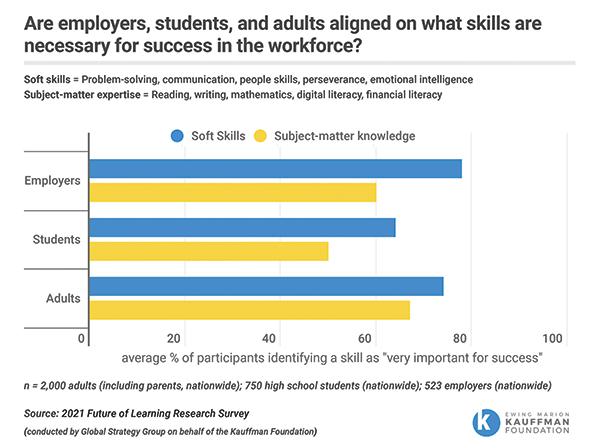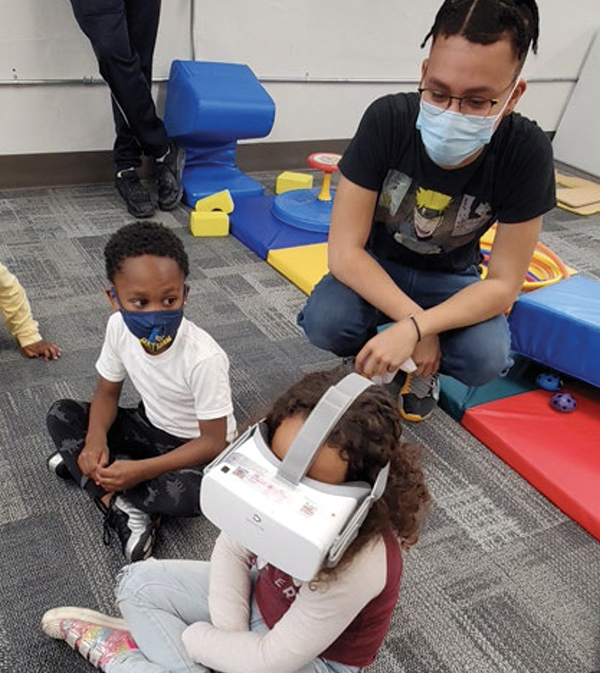In 2020, an early learning center in Kansas City wanted to provide their young students the experience of field trips while staying in a safe environment during the pandemic. Five students from a nearby high school worked with teachers and created virtual and augmented reality experiences for the 3- to 5-year-olds, based on the units the teachers were covering in class.
In the north part of the metro, in a small commuter town, high school students surveyed residents on behalf of a local civic improvement organization, to assess the feasibility of a downtown entertainment district.
These are just two examples of a metro-wide initiative in Kansas City that seeks to create meaningful connections between employers and high school students.
That’s because preparing a thriving future workforce is no longer the sole purview of educators. With rapidly changing demands in the workplace, it is as much the responsibility of today’s employers, and every other community stakeholder, to help prepare students for success in life after high school.
Kansas City-area employers embrace this role and are participating in a new program called the Real World Learning Initiative, with encouraging results.
Sponsored by the Ewing Marion Kauffman Foundation, Real World Learning is the largest and most promising regional high school improvement project in the country, according to a new case study from Getting Smart. With equity as a central value, the initiative creates community agreements with a goal to provide relevant, real-world experiences for every student in the KC metro area. Through the initiative, participating education, business, civic and community leaders are providing the opportunity for students to gain the skills and credentials needed to succeed in the real world. Ultimately, the region gains a diverse, prepared workforce needed for a vibrant community and economy.
Now in its fourth year, the Real World Learning Initiative is expansive in its reach and unusual in the amount of regional cooperation it is generating. It boasts more than 80,000 students impacted in 75 high schools in urban, suburban, and rural districts spread across six counties and two states. While a high level of school district participation has been essential, the program would not be successful without business and civic involvement. Those collaborators provide the internships and projects which are integral to students gaining the skills and competencies needed for the current and future workforce.
Real Workforce Preparedness
The need for such an initiative is based on evolving workforce needs. National surveys conducted on behalf of the Kauffman Foundation captured the perspectives of employers, adults, and students. Findings reveal a clear shift in opinion toward having high school focus as much, if not more, on preparing students for careers as it does for higher education.
Employers in particular seem less interested in traditional academic skills and achievements. When asked about their preferences as to the emphasis of high school, 77% of employers chose real-world skills over a focus on fundamental subject matter such as reading and writing.
Increasingly, employers say they would hire more high school graduates if they had the kind of real-world experience that would better prepare them for work.
Regional Cooperation and Application
The case study by Getting Smart, a nationally recognized organization that focuses on accelerating and amplifying innovations in teaching and learning, outlines the methods used in the initiative, such as ensuring all students graduate by 2030 with one or more experiences called “Market Value Assets” (MVAs):
- Work experiences: internships and client-connected projects
- Entrepreneurial experiences: starting a business or launching an initiative
- College credit: at least nine credits
- Industry recognized credentials
The case study points out how the frameworks that have evolved from the Real World Learning Initiative have potential to be replicated in other metros for workforce development, but are also applicable for other programs that need regional cooperation.
The case study highlights the Initiative’s five guiding principles:
- Build Demand: Engage business and districts together to identify opportunities for collaboration in their backyard and support districts’ development of customized approaches to MVA attainment.
- Reduce Barriers to Entry: Use an opt-in strategy that elevates champions that brings in potential partners instead of excluding them.
- Build Capacity: Ensure that all stakeholders understand the work, the goals and the needs by investing in technical assistance and clear communication.
- Learn Quickly: Make new learning a priority by developing learning cohorts with shared learning agendas and foster adoption of new approaches at an accelerated pace.
- Align Funding with Expectations: Increase the commitment to districts in accordance with meeting/exceeding accountability measures and impact on learning goals.

The authors of the case study identified five elements of the Real World Learning Initiative they say could be useful to other changemakers seeking similar high school transformations, or more broadly, in human development work ranging from early learning to adult education:
- Community agreements on valuable experiences: goal definitions specific enough to drive quality in a framework flexible for schools to adopt in their own way.
- Planning grants that support priority mobilization efforts.
- Technical assistance that promotes peer learning across leadership networks.
- Professional learning experiences that support quality implementation at scale.
- Data infrastructure including support for core applications and outcome evaluation.
Beyond the benefits to students, Real World Learning is a two-way street, providing valuable experiences for business leaders engaged in the program.
“If you’re an employer and you want new employees to enter your workforce and be future leaders, you need to understand how they interact,” said Anita Newton, chief innovation officer for CommunityAmerica Credit Union (CACU) and a member of the Kauffman Foundation Board of Trustees. CACU is a partner in the Real World Learning Initiative.
Kansas City’s Real World Learning infrastructure is up and running, and the momentum is growing. The case study is a practical resource for other regions ready to make it a priority, build partnerships, create time in the schedule, encourage integration and support teacher professional learning.
Learn more about the Real World Learning Initiative at www.kauffman.org/real.
Miles Sandler is the director of engagement – education in Public Affairs for the Ewing Marion Kauffman Foundation, where she serves as an advocate and constituency builder for the Foundation’s key educational outreach programs.
She is responsible for designing and executing an education strategy that enhances awareness, generates engagement and drives action.
